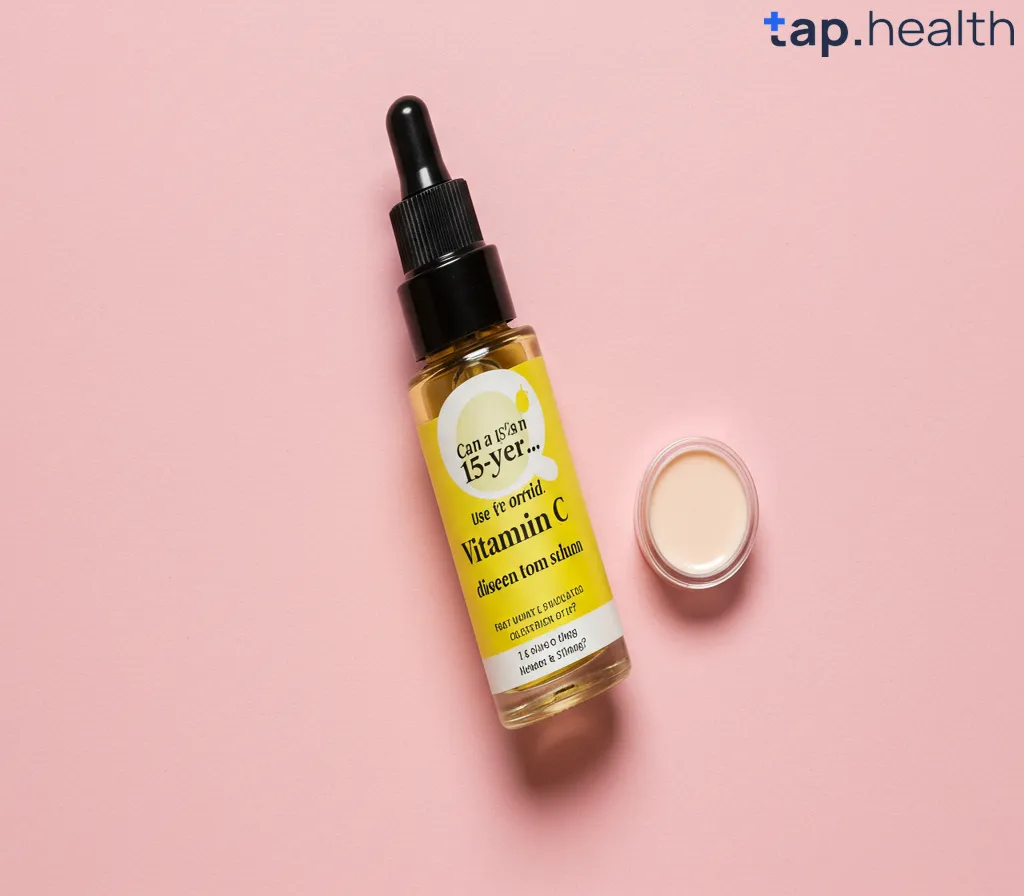Vitamin C serums are a popular skincare product, praised for their ability to brighten skin, even out skin tone, and fight signs of aging. But when it comes to teenagers, many wonder if it’s safe to use Vitamin C serum at such a young age. If you’re 15 years old or the parent of a teenager, you might be asking: “Can a 15-year-old use Vitamin C serum?” The short answer is yes, but there are a few things to consider.
In this blog post, we’ll break down everything you need to know about Vitamin C serums and whether they’re suitable for teens. From understanding the benefits and risks to choosing the right product, we’ve got you covered.
What is Vitamin C Serum?
Vitamin C serum is a skincare product that contains a high concentration of Vitamin C, an essential nutrient known for its skin benefits. This serum is typically applied directly to the skin and is designed to deliver Vitamin C in a potent form.
Vitamin C is a powerful antioxidant that helps to:
- Brighten the skin by reducing hyperpigmentation and dark spots.
- Boost collagen production, improving the skin’s firmness and elasticity.
- Protect against free radical damage, which helps in preventing premature signs of aging.
Vitamin C serums are commonly used for their brightening and anti-aging effects. However, as with any skincare product, it’s important to understand how and when to use it—especially when you’re still a teenager.
Can a 15-Year-Old Use Vitamin C Serum?
Yes, a 15-year-old can use Vitamin C serum, but there are important factors to consider before applying it to your skincare routine. Teenagers often have different skin needs than adults, and the skin of a 15-year-old can be more sensitive, depending on their individual skin type.
Benefits of Vitamin C Serum for Teenagers
Even though teenagers generally have more resilient skin, Vitamin C serums can offer several benefits for young skin:
1. Brightens and Evens Skin Tone
Teenagers often deal with acne, which can leave behind dark spots and uneven skin tone. Vitamin C can help fade these spots and even out the skin’s appearance, providing a brighter, fresher complexion.
2. Fights Acne Scarring
If you’ve ever had acne, you know that it can leave behind scars. Vitamin C’s ability to promote skin healing and collagen production can help reduce the appearance of acne scars over time.
3. Prevents Premature Aging
While premature aging is not a major concern for most teenagers, using Vitamin C serum can help prevent future wrinkles and fine lines. By boosting collagen production, Vitamin C helps keep the skin firm and youthful-looking.
4. Protects from Environmental Damage
Teenagers spend a lot of time outdoors, which exposes them to harmful UV rays, pollution, and other environmental stressors. Vitamin C has antioxidant properties that can help protect the skin from this damage.
Can Vitamin C Serum Cause Irritation for Teenagers?
Although Vitamin C is generally safe for most skin types, it can cause irritation for some individuals—especially those with sensitive skin. If you have acne-prone or sensitive skin, it’s essential to patch test the serum on a small area of your skin before applying it all over your face.
It’s also important to choose a Vitamin C serum with a concentration that suits your skin type. For teenagers, it’s recommended to start with a lower concentration (around 10%) to avoid irritation.
At What Age Can You Start Using Vitamin C Serum?
There’s no set age for when you should start using Vitamin C serum, but most skincare experts recommend that teenagers can begin using it around the age of 15, especially if they have concerns like acne, dark spots, or uneven skin tone.
If you’re dealing with specific skin issues such as acne scarring or pigmentation, Vitamin C serum can be a great addition to your skincare routine. However, it’s always a good idea to consult with a dermatologist before starting any new skincare product.
How to Use Vitamin C Serum for Teenage Skin
Proper application is key to getting the most out of your Vitamin C serum. Here’s a step-by-step guide on how to use it correctly:
1. Cleanse Your Skin
Start with a gentle cleanser that suits your skin type. Cleanse your face to remove dirt, oil, and any leftover makeup.
2. Apply Toner (Optional)
If you use a toner in your skincare routine, apply it after cleansing. It helps to balance the skin’s pH levels and prepare the skin for the serum.
3. Apply the Vitamin C Serum
Take a small amount of Vitamin C serum (a few drops are usually enough) and gently massage it into your skin. Focus on areas with dark spots or acne scars, but don’t forget to apply it to the entire face.
4. Follow Up with Moisturizer
After the serum has absorbed into your skin (it should take just a few minutes), apply a good moisturizer to lock in hydration and keep your skin soft and smooth.
5. Use Sunscreen
Vitamin C can make your skin more sensitive to the sun, so it’s crucial to apply sunscreen with SPF 30 or higher during the day. This will protect your skin from UV damage while enhancing the serum’s effectiveness.
Tip: Start Slowly
If you’re new to Vitamin C serums, begin by using it every other day and gradually increase the frequency as your skin gets used to it.
Are There Any Risks to Using Vitamin C Serum at 15?
Vitamin C is generally safe for most skin types, but there are a few risks to be aware of, especially for teenagers with sensitive or acne-prone skin:
1. Skin Irritation
As mentioned earlier, Vitamin C can cause irritation, redness, or stinging for some people. If you notice any discomfort, stop using the serum and consult with a dermatologist.
2. Sun Sensitivity
Vitamin C can make your skin more sensitive to sunlight, which increases the risk of sunburn. Always wear sunscreen when using Vitamin C, especially during the day.
3. Allergic Reactions
While rare, some people may be allergic to Vitamin C or other ingredients in the serum. Always perform a patch test before using a new product.
What Are the Best Vitamin C Serums for Teenagers?
When selecting a Vitamin C serum for a 15-year-old, it’s important to choose one that is gentle, effective, and suitable for your skin type. Here are some of the best Vitamin C serums for teenagers:
1. La Roche-Posay Pure Vitamin C Face Serum
This serum contains 10% Vitamin C and is known for being gentle on sensitive skin. It helps brighten the complexion and reduces dark spots.
2. CeraVe Vitamin C Serum
CeraVe’s Vitamin C serum contains 10% pure Vitamin C and is enriched with hyaluronic acid, making it an excellent option for teenagers with dry skin.
3. Neutrogena Rapid Tone Repair Dark Spot Corrector
A popular choice for those dealing with acne scars and dark spots, this serum contains 20% Vitamin C and is formulated for all skin types.
How Often Should a 15-Year-Old Use Vitamin C Serum?
Teenagers can use Vitamin C serum once or twice daily, depending on their skin’s tolerance. If you have sensitive skin, start by using the serum once a day or every other day to see how your skin reacts.
FAQ: Can a 15-Year-Old Use Vitamin C Serum?
1. Can a 15-year-old with sensitive skin use Vitamin C serum?
Yes, but with caution. It’s best to choose a serum with a lower concentration of Vitamin C (around 10%) and do a patch test to check for any irritation.
2. What is the best Vitamin C serum for acne scars?
The best Vitamin C serums for acne scars are those that contain 10-20% Vitamin C and are designed to target hyperpigmentation. Look for products from brands like La Roche-Posay, CeraVe, and Neutrogena.
3. Is it safe to use Vitamin C serum every day?
Yes, but if you’re new to Vitamin C, start with every other day and gradually increase the frequency as your skin adjusts.
4. Can Vitamin C serum help with oily skin?
Yes, Vitamin C can help balance oily skin by reducing excess oil and preventing clogged pores, which can lead to acne.
5. Can I use Vitamin C serum with other skincare products?
Yes, but avoid using it with strong exfoliants like AHAs or BHAs, as this can irritate the skin. It’s best to layer Vitamin C with a gentle moisturizer and sunscreen.
In conclusion, a 15-year-old can safely use Vitamin C serum, especially if they are dealing with acne, dark spots, or uneven skin tone. Just make sure to choose the right product, start slowly, and protect your skin from the sun. Always consult with a dermatologist if you’re unsure about how to incorporate Vitamin C into your routine.



